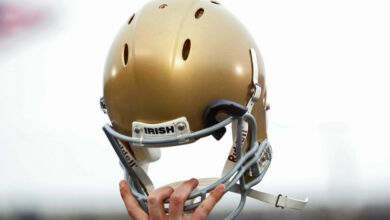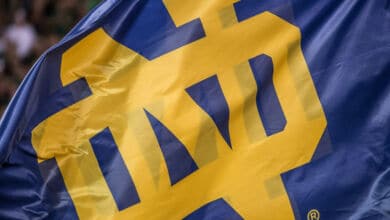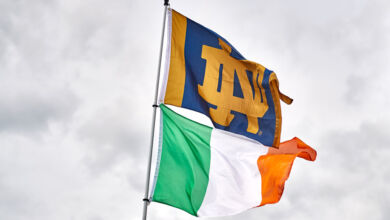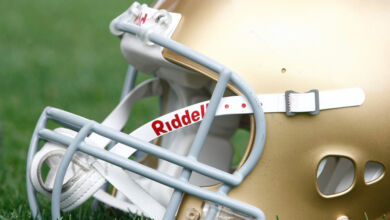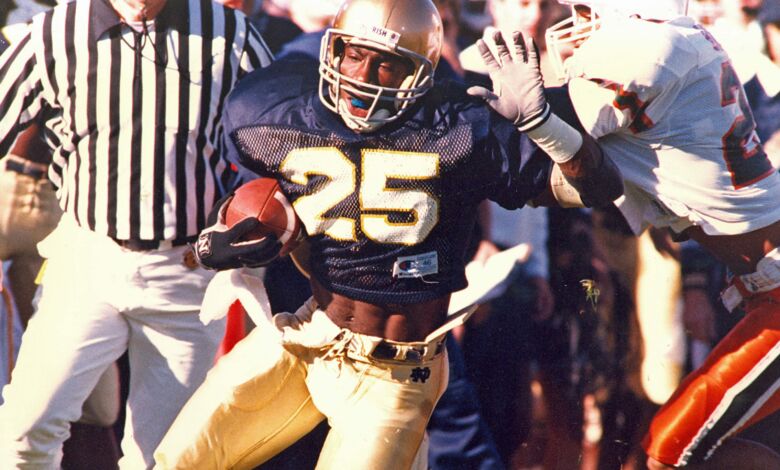
Between 1971 and 1990, the Notre Dame Fighting Irish and Miami Hurricanes developed an intense rivalry, meeting every year except for 1986. During those two decades of action, the matchup evolved from a complete domination by the Irish to a stretch of six wins in eight contests for the Hurricanes.
However, Notre Dame’s 29-20 home victory over Miami on October 20, 1990, would be the last meeting between the schools for the next 20 years. The Irish hierarchy had decided to end the rivalry years before this finale, with the increasingly contentious on-field interactions between the teams helping to bolster their decision. Most notably, the infamous Catholics vs. Convicts battle two years earlier had included a pre-game brawl.
The 1990 farewell still packed plenty of punch, with both teams entering the game with 4-1 records. The second-ranked Hurricanes took the field as three-point favorites over sixth-ranked Notre Dame, with both teams well aware that a loss would remove them from the national championship conversation.
The Coaches
Lou Holtz was in the middle of his fifth season with the Irish and had already achieved his ultimate goal of a national championship in 1988, when he led his squad to the school’s 11th national title. Entering this battle with Miami, Holtz had compiled a 41-12 record since taking the Notre Dame job in 1986. However, his teams had dropped two of the three clashes against the Hurricanes.
Dennis Erickson was in his second season at the helm of the Hurricanes, having taken over after Jimmy Johnson abruptly left to coach the Dallas Cowboys. Erickson led his first Miami team to a national title the year before and like Johnson in 1988, was bringing the defending champions to town to face the Irish.
The Key Players
Rick Mirer began his three-year run as Notre Dame’s starting quarterback in 1988 and was throwing for an average of just under 190 yards per game before this contest. His main weapon through the air was the electrifying Rocket Ismail, who was also dangerous carrying the ball. Joining Ismail in the backfield was Rodney Culver. On defense, tackle Chris Zorich, linebacker Michael Stonebreaker and cornerback Todd Lyght were mainstays.
In contrast to the Irish, the Hurricane offense was fueled by the passing game, with quarterback Craig Erickson having already thrown for nearly 300 yards per game that season. His main three options: Wesley Carroll, Randal Hill and Lamar Thomas ended the 1990 campaign with 148 receptions between them. The Miami defense had tackle Russell Maryland and linebackers Maurice Crum and Michael Barrow as the standouts.
The Game
The Irish endured a rough start when Culver fumbled the ball away on the first play from scrimmage. From the Notre Dame 25, the Hurricanes needed six plays to score the first touchdown, with Craig Erickson’s 13-yard run on third down setting up the score.
Thanks to an ill-timed offside call on Miami with Notre Dame in punt formation, the Irish were able to whittle three points off their deficit. Mirer took advantage and helped set up a Craig Hentrich 25-yard field goal with just under seven minutes remaining in the opening quarter.
The Irish defense stopped the Hurricanes but Mirer then threw an interception. That same defense then tightened enough to limit the Miami damage to a 23-yard field goal after a 43-yard pass from Craig Erickson to Thomas put the ball at the Notre Dame one.
Ismail then took matters into his own hands to tie the game up before the end of the first quarter. He scored on a 94-yard kickoff return, part of a monster day for the Heisman candidate. By the time the game had ended, Ismail would have 268 yards of total offense, leading the Irish ground game with an even 100 yards.
Notre Dame briefly took its first lead of the contest early in the second quarter after Greg Davis’ interception. That led to a 44-yard field goal from Hentrich but Miami responded with a nine-play, 80-yard touchdown drive as Craig Erickson took it in himself from the one for the score.
Hentrich’s busy day continued when he sandwiched a pair of field goals around the halftime break. He then added his fifth and final three-pointer of the game with less than two minutes remaining in the third quarter. That made it 22-17 in favor of the Irish with 15 more dramatic minutes left to play.
Sensing the gravity of their situation, the Hurricanes used less than three minutes of clock to reduce the margin to two points. Picking up four first downs on its 11-play, 72-yard drive, Miami moved the ball deep into Irish territory but ended up having to settle for a 25-yard field goal.
The Hurricane defense stopped Notre Dame but on Miami’s subsequent drive, Craig Erickson forced a throw while under a heavy rush that was intercepted by Lyght at the Irish 10. Starting at its own 23, the Irish moved down the field in seven plays, with Culver catching Mirer’s 21-yard scoring toss to make it 29-20.
Now in desperation mode with just over six minutes left, Miami quickly moved down the field. With roughly five minutes left, Hurricanes running back Leonard Conley was stripped of the ball at the Notre Dame eight by Davis, with Stonebreaker making the recovery at the two.
From there, the Irish went exclusively to the run to eat up the remaining clock. The celebration then began for Notre Dame fans, with plenty of them engulfing the field.
The Aftermath
Miami’s path to another title was blocked after the loss, a fate it took out on its next four opponents. In those matchups, they won by an average of 34 points and later destroyed third-ranked Texas 46-3 in the Cotton Bowl. In that game, the Hurricanes were flagged 16 times, including nine for unsportsmanlike conduct. That led to a taunting penalty being put in place that was dubbed the Miami Rule.
The fifth-ranked Irish won four of their final five regular season clashes, yet still had a slim chance at a national title. That hope dropped considerably after Georgia Tech beat Nebraska in the Citrus Bowl. Still, the Irish nearly knocked off top-ranked Colorado in the Orange Bowl. The 10-9 loss was especially heartbreaking because a last-minute punt return touchdown by Ismail was called back for a phantom clipping penalty.
After the 1990 season, Notre Dame and Miami wouldn’t face each other again until the 2010 Sun Bowl, that’s since been followed by three regular season games. From 2025 to 2037, the two schools are tentatively set to battle seven times.
